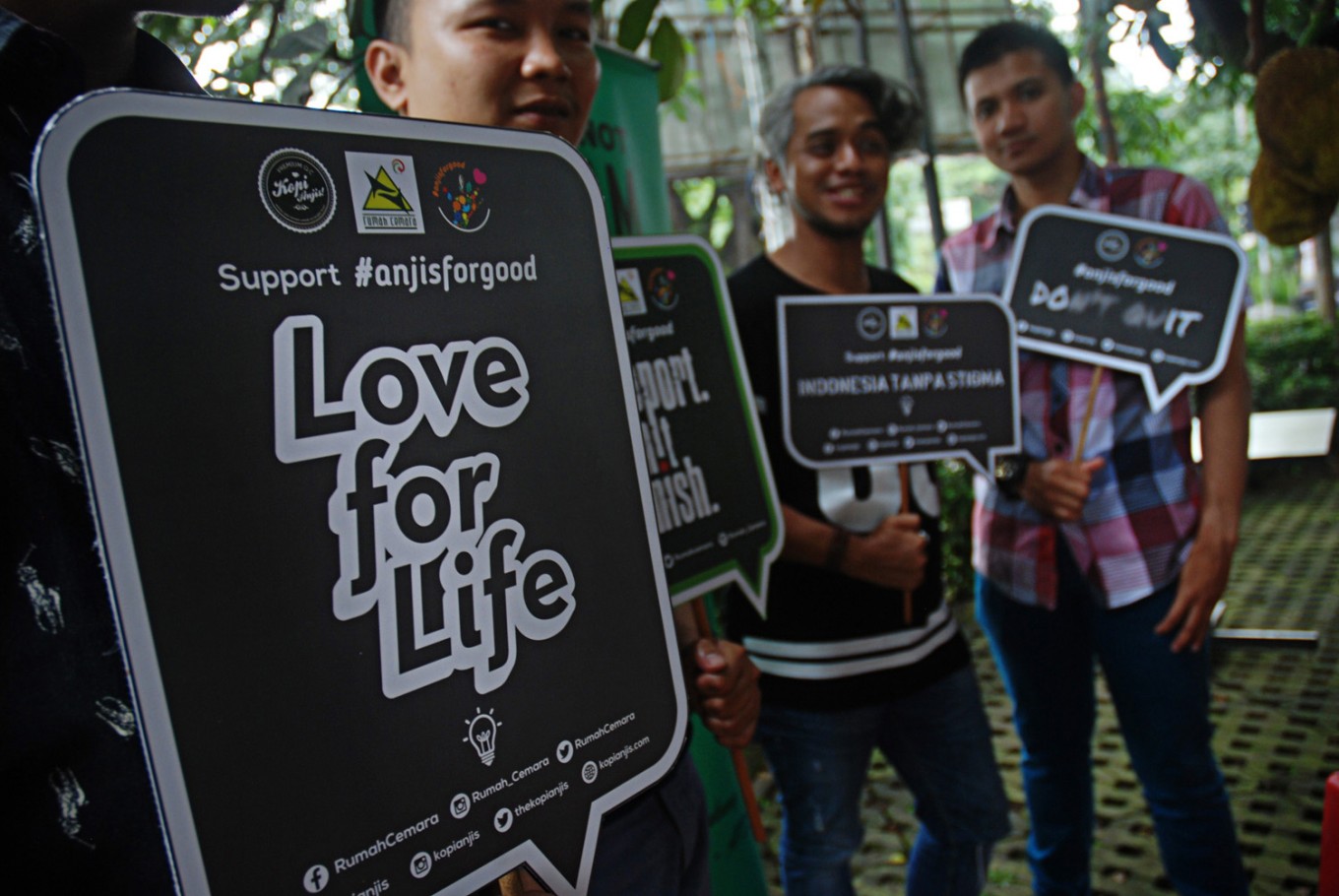Popular Reads
Top Results
Can't find what you're looking for?
View all search resultsPopular Reads
Top Results
Can't find what you're looking for?
View all search resultsHIV/AIDS positive children left out in cold
Life has never been easy for children living with HIV/AIDS, a cruel disease that requires costly daily treatments.
Change text size
Gift Premium Articles
to Anyone
 Against stigma – Counsellors from Rumah Cemara and Puzzle Club, two organizations concerned in fighting against HIV AIDS, introduce the importance of HIV AIDS tests to young people in a campaign themed “Love for Live” in the Indonesia Without Stigma program in Bandung, West Java, on Oct.22. Hepatitis C is a common co-infection on people who suffer from HIV. (Antara/Fahrul Jayadiputra)
Against stigma – Counsellors from Rumah Cemara and Puzzle Club, two organizations concerned in fighting against HIV AIDS, introduce the importance of HIV AIDS tests to young people in a campaign themed “Love for Live” in the Indonesia Without Stigma program in Bandung, West Java, on Oct.22. Hepatitis C is a common co-infection on people who suffer from HIV. (Antara/Fahrul Jayadiputra)
L
ife has never been easy for children living with HIV/AIDS, a cruel disease that requires costly daily treatments. But what makes their lives even more difficult is the fact that neither the government nor the public seem to be willing to help them.
In many cases, society only makes their lives harder.
Rumah Singgah Lentera, a local NGO that provides protection for 11 HIV/AIDS children in Surakarta, Central Java, said it had been struggling to provide support for the children due to resistance from local residents.
Since its establishment in 2012, the organization and children have been forced to move from one location to another after being rejected by local residents. They currently live in a house provided by a local cleric in the Laweyan area.
The children, who are aged between 2 to 14 years old and come from Surakarta and several other cities like Salatiga and Boyolali in Central Java and Ngawi in East Java, have been forced to move from one school to another as some parents objected to their presence in fear they would transmit their disease to other students.
The Surakarta city administration has offered them housing in the Punggawan area, but the plan has been suspended, again, due to rejection from locals.
Meanwhile, Rumah Singgah Lentera has had to work hard to get enough money to support the 11 children. The NGO spends around Rp 10 million (US$750) for children every month.
Routine health checks and drugs were covered by the Surakarta administration. Eight children have been registered with the city’s Citizens Health Assistance (BKMKS) program. The remaining three were supported by the Child Social Welfare Program (PKSA), which only gave Rp 1.1 million per child for a year.
However, apart from the health services, Lentera has to bear all other costs to look after the children, including food, clothes and education. “Apart from the treatment, we need to fulfill all of the children’s needs on our own with money that we gather among ourselves [the managers] or funds from donor contributions and aid from social agencies,” Lentera manager Puger Mulyono said.
Puger, whom the children referred to as ayah (father), said Lentera also needed to bear all the costs when they traveled out of town to pick up HIV/AIDS-positive children who had been cast out from families that were no longer willing to look after them for various reasons.
One time, Puger said, Lentera went to pick up an AIDS-positive boy who had been brought by his family to Blitar Social Services in East Java. The latter contacted Lentera because it did not have a service or program to take care of the child, who needed intensive treatment for his illness.
“Indonesia has not yet established an agency to take care of children living with HIV/AIDS. Maybe Lentera was the first one to initiate it,” Puger, who co-founded Lentera with his friend Yunus Prasetyo, said.
UNICEF child specialist Naning Julianingsih asserted the importance for the government to create an integrated system and services to support children living with HIV/AIDS, since social assistance alone was far from enough, especially when their parents or guardians passed away.
“These children cannot go alone to hospitals to access ARV therapy. A system should be established, such as an accessible program that provides intensive treatment to prevent HIV-positive children from becoming AIDS-positive,” she said.
She added the government should find solutions for children living with HIV/AIDS to have their rights to health care and education fulfilled, such as providing home-schooling and intensive treatment inside their houses for those unable to go out.
Surakarta Mayor FX Hadi “Rudy” Rudyatmo has expressed his unwavering support for the organization and would work to raise public awareness about HIV/ AIDS. “These children need to be taken care of.”









